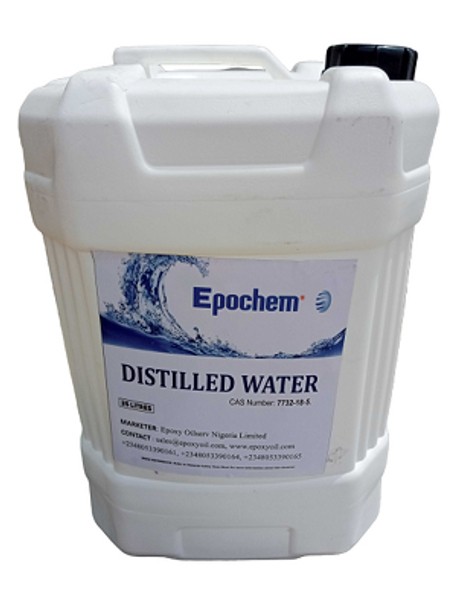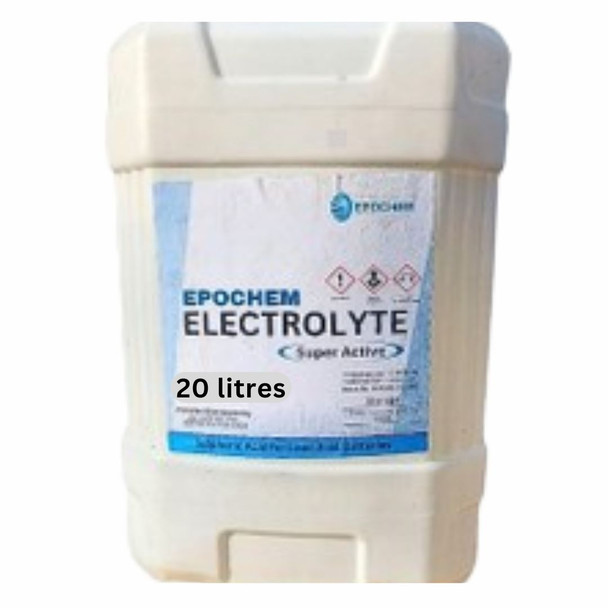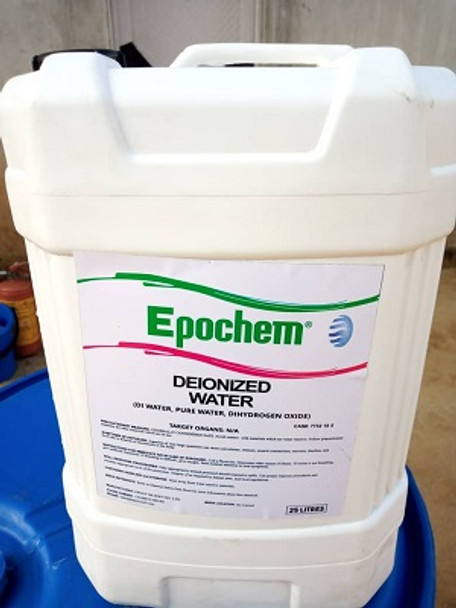Distilled vs. Tap Water for Inverter Batteries: What's the Difference?
Introduction
Inverter batteries are crucial for providing backup power during blackouts and ensuring smooth operations for homes and businesses. Proper maintenance of these batteries is essential for their longevity and optimal performance. One key aspect of battery maintenance is the water used to maintain the electrolyte balance in the battery.
Many people are unaware of the impact the type of water used can have on the overall health of their inverter battery. While tap water may seem like a convenient and cost-effective solution, it can actually harm the battery’s performance. On the other hand, distilled water is specially purified to avoid these issues and is considered the best option for inverter batteries.
In this article, we’ll compare distilled water and tap water, explore the benefits of using distilled water, and explain why it is the better choice for your inverter battery.
Epochem Distilled Water 20 Liters
Key takeaway
- Optimal Performance: Distilled water ensures efficient functioning and longevity of inverter batteries by preventing sediment buildup and mineral contamination.
- Risk of Damage: Using tap water can introduce impurities and minerals that may corrode battery components and reduce performance.
- Cost vs. Value: While distilled water may have a slightly higher upfront cost, its long-term benefits outweigh the risks associated with using tap water.
Understanding the Role of Water in Inverter Batteries
Inverter batteries, typically lead-acid batteries, rely on a mixture of water and sulfuric acid as the electrolyte. This electrolyte helps facilitate the chemical reaction that occurs within the battery to store and release electrical energy. The role of water is to maintain the correct balance in this chemical reaction by ensuring the electrolyte stays at the right concentration.
If the water level in the battery drops too low, it can expose the lead plates inside the battery to air, leading to damage and a decrease in the battery's performance. To maintain the correct water level, regular monitoring and refilling are necessary.
Using the right type of water is critical to ensure that the electrolyte remains balanced and free of impurities. Impurities in the water can interfere with the battery's chemical processes, leading to performance issues, corrosion, and potentially, battery failure.
What Is Distilled Water?
Distilled water is water that has been purified through a process called distillation. This process involves boiling water to produce steam and then condensing that steam back into water. During this process, impurities such as minerals, salts, and chemicals are left behind, resulting in water that is almost entirely free of contaminants.
Distilled water is often used in applications that require high purity, such as medical, automotive, and laboratory settings. In the context of inverter batteries, distilled water is ideal because it does not introduce any additional minerals or chemicals into the battery, ensuring that the electrolyte remains pure and the battery operates efficiently.
Characteristics of Distilled Water:
- Purity: Distilled water is free from dissolved minerals, salts, and other contaminants.
- Neutral pH: It has a pH level close to neutral, which helps prevent chemical imbalances in the battery.
- Consistency: Since distilled water is purified, it maintains a consistent quality, ensuring the battery functions properly.
What Is Tap Water?
Tap water, also known as municipal water, is the water supplied to homes and businesses through pipes. While it is treated to make it safe for human consumption, it often contains dissolved minerals, chemicals, and other impurities that can affect the performance of inverter batteries.
The composition of tap water can vary significantly depending on the location, as different municipalities use different sources and treatment methods. Common minerals and chemicals found in tap water include calcium, magnesium, chlorine, fluoride, and sulfates. These minerals, while beneficial for human health in small quantities, can be harmful to the internal components of inverter batteries.
Minerals and Impurities in Tap Water:
- Calcium and Magnesium: These minerals can cause sediment buildup inside the battery, which can affect the chemical reactions.
- Chlorine and Fluoride: Chemicals like chlorine can cause corrosion on the battery’s internal plates and terminals, reducing efficiency.
- Sulfates: These can react with the battery’s lead plates, leading to the formation of lead sulfate, which can hinder battery performance.
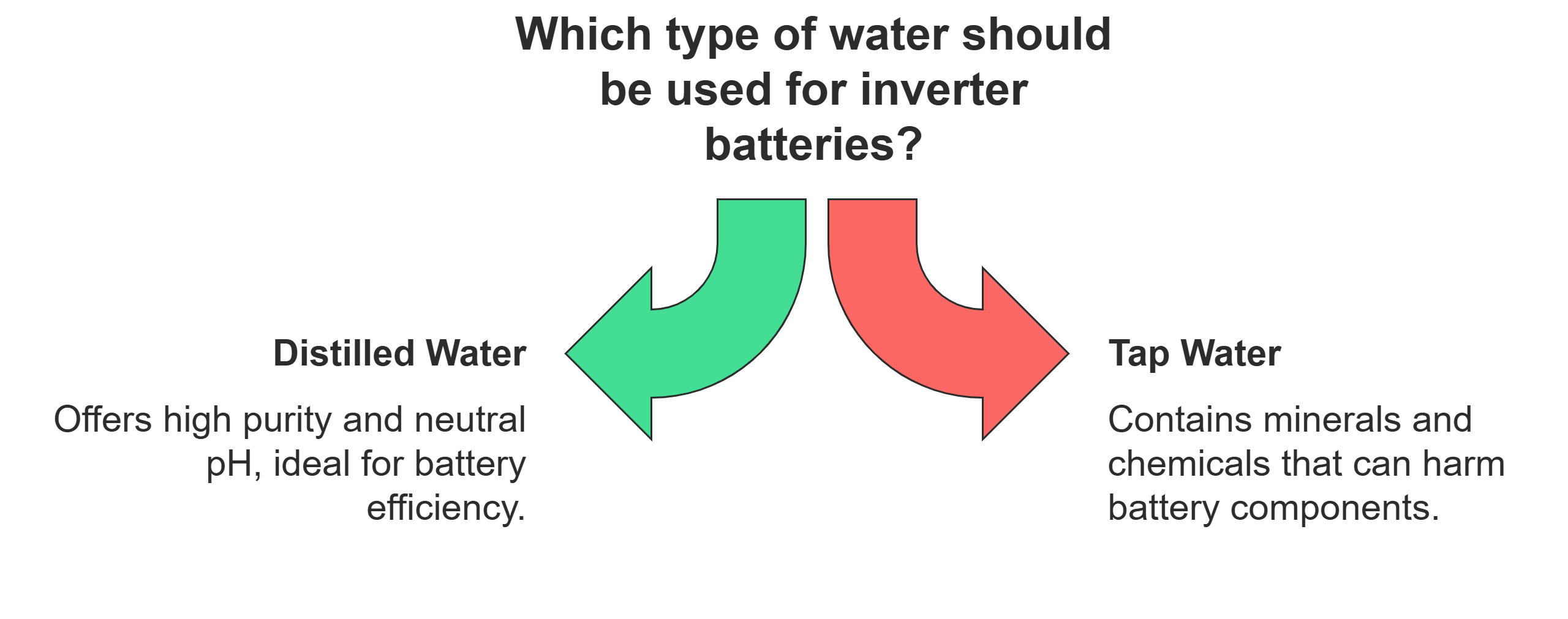
The Risks of Using Tap Water in Inverter Batteries
Although tap water is convenient and inexpensive, using it in your inverter battery can lead to several problems that negatively impact performance and lifespan.
Mineral Build-Up
One of the most significant risks of using tap water in inverter batteries is the accumulation of minerals inside the battery. Minerals like calcium and magnesium, which are commonly found in tap water, can settle at the bottom of the battery or form deposits on the internal components. Over time, this mineral buildup can interfere with the chemical reactions in the battery, reducing its efficiency and power output.
The sediment created by these minerals can also cause the battery’s electrolyte mixture to become too concentrated in certain areas, disrupting the overall balance of the battery. This imbalance can result in slower charging, less reliable power output, and increased wear on the battery.
Corrosion
Tap water often contains chlorine and other chemicals, which can cause corrosion on the battery’s internal components, including the lead plates and terminals. Corrosion weakens the battery's structural integrity, reduces the efficiency of the chemical reactions, and increases the likelihood of leaks. Corroded terminals can also cause poor electrical contact, making the battery less effective and potentially leading to overheating or complete battery failure.
Corrosion from the use of tap water can drastically shorten the lifespan of an inverter battery, meaning that users will have to replace the battery much sooner than expected, leading to higher long-term costs.
Reduced Performance
The impurities in tap water can affect the overall performance of the inverter battery. The buildup of minerals and chemicals from tap water can cause the battery to charge and discharge more slowly. This results in slower response times during power outages and a reduced ability to provide backup power when needed.
Additionally, the impurities can cause the battery to overheat more easily, further decreasing its capacity and lifespan. Overheating can lead to battery swelling, leakage, and other dangerous conditions.
Shortened Battery Life
The combination of mineral buildup, corrosion, and reduced performance can all lead to a significant reduction in the battery’s overall lifespan. A battery that is regularly exposed to tap water may only last a few years before needing to be replaced, whereas a battery maintained with distilled water can often last much longer—saving you money on replacements and maintenance over time.
Potential Safety Hazards
Inverter batteries that use tap water may be at an increased risk of damage or failure. Over time, the accumulation of minerals and corrosion can cause leaks, which can be dangerous, especially if the battery leaks acid. Leaking acid is not only harmful to the battery and surrounding equipment but can also pose safety hazards to individuals nearby.
Demineralised Water 20 Liters
The Benefits of Using Distilled Water in Inverter Batteries
In contrast to tap water, distilled water offers several advantages that make it the ideal choice for maintaining inverter batteries.
Purity and Quality
The primary benefit of using distilled water is its purity. Distilled water is free from the minerals, chemicals, and other impurities commonly found in tap water. Since it contains no calcium, magnesium, chlorine, or fluoride, distilled water will not cause sediment buildup, corrosion, or chemical imbalance within the battery.
With distilled water, the electrolyte solution inside the battery remains pure, allowing the battery to function at its optimal performance.
Prevention of Corrosion and Sediment Buildup
Because distilled water lacks minerals, it prevents the formation of mineral deposits inside the battery. This means there is no risk of sediment buildup on the internal plates or the battery casing. This also helps prevent the lead plates from corroding, ensuring the battery operates efficiently for a much longer time.
Extended Battery Lifespan
The purity of distilled water helps extend the lifespan of the battery. By preventing corrosion, mineral buildup, and chemical imbalances, distilled water keeps the internal components of the battery in good condition. This results in fewer maintenance issues and a longer-lasting battery, which can save you money on replacements and repairs.
Improved Performance
Distilled water ensures that the electrolyte in the battery maintains the correct balance, which improves the battery’s performance. With distilled water, the battery can charge and discharge more efficiently, providing better backup power when needed. It also helps the battery operate at optimal temperature, reducing the risk of overheating.
Epochem Electrolyte 20L
Comparing Cost: Distilled vs. Tap Water
While the initial cost of distilled water may be slightly higher than tap water, it’s important to consider the long-term savings and benefits.
Cost of Distilled Water
Distilled water is typically affordable, especially when purchased in bulk. While it might seem more expensive at first glance, using distilled water in your inverter battery can save you money over time by prolonging the battery's lifespan and reducing the need for frequent repairs or replacements. Additionally, distilled water helps avoid maintenance costs associated with the damage caused by tap water, such as corrosion, sediment buildup, and performance issues.
Cost of Tap Water
Tap water is essentially free if you already have access to it. However, when used in inverter batteries, the hidden costs of using tap water can quickly add up. The increased likelihood of battery failure due to corrosion and sediment buildup means you may need to replace the battery sooner, leading to higher replacement costs. Moreover, the reduced performance of the battery means it will take longer to charge and may provide less backup power, which can be a significant inconvenience, especially during power outages.
Ultimately, the cost of using tap water can outweigh the initial savings. By investing in distilled water, you are protecting your battery from damage and ensuring it performs well over its lifetime.
Long-Term Savings from Using Distilled Water
Although distilled water may cost slightly more upfront, it is an investment that pays off in the long run. A properly maintained inverter battery with distilled water can last significantly longer than one that uses tap water. The extended battery life means fewer replacements, less frequent maintenance, and better overall value for your money.
Comparison of Distilled water vs. Tap water for Inverter Batteries
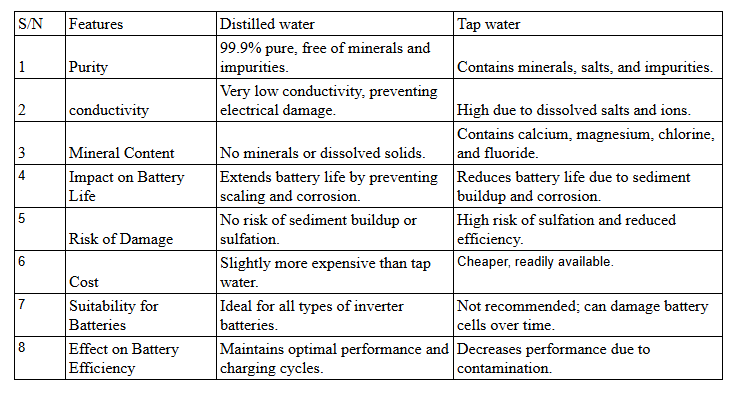
Practical Considerations for Battery Maintenance
Proper maintenance is crucial to extending the life and performance of your inverter battery, regardless of whether you're using distilled or tap water. Here are some practical tips to ensure your battery stays in top condition.
How to Properly Add Water to an Inverter Battery
- Turn off the inverter and disconnect it from any power source to avoid electrical hazards.
- Remove the battery cover to access the water reservoir.
- Check the water levels using the water level indicators. If the water is below the recommended level, you will need to add more water.
- Add distilled water carefully to avoid overfilling the battery. The water level should be just above the plates but not touching the battery terminals.
- Clean the battery terminals and ensure they are free from dirt and corrosion.
- Reattach the battery cover and check that the connections are secure.
Frequency of Water Refills
Water levels in an inverter battery should be checked regularly, at least every 2-3 months, or more often if the battery is heavily used. When refilling, ensure you only use distilled or demineralized water. Avoid topping up with tap water, as the minerals in it can harm the battery over time.
Storage and Handling of Distilled Water
Distilled water should be stored in clean, airtight containers to prevent contamination. It is essential to keep it away from direct sunlight and heat sources. When handling distilled water, use clean tools and avoid touching the water with dirty hands to maintain its purity.
Epochem Deionized water 20 litres
Frequently Asked Questions (FAQs)
Can I use bottled water in my inverter battery instead of distilled water?
No, bottled water often contains minerals that can harm your inverter battery. Always use distilled or demineralized water to prevent damage.
How often should I check and refill water in my inverter battery?
You should check the water levels every 2-3 months or more frequently depending on how much the battery is used. Always top up with distilled water as needed.
Is distilled water really necessary for inverter batteries?
Yes, distilled water is necessary because it prevents the buildup of minerals and impurities that can cause corrosion and reduce battery performance.
What are the signs that my inverter battery needs water?
Signs include reduced performance, shorter battery life, or the battery not holding a charge. Check the water levels regularly and refill if necessary.
Can tap water be used in an emergency if I don’t have distilled water?
While it’s not recommended, tap water may be used in an emergency if there are no other options. However, you should replace it with distilled water as soon as possible to avoid damage to the battery.
Related Article
How to Add Distilled Water to Your Inverter Battery (Step-by-Step)
Signs Your Inverter Battery Needs Distilled Water
Why Use Distilled Water For Inverter Battery
Conclusion
When it comes to maintaining inverter batteries, the type of water you use plays a crucial role in ensuring the battery’s performance, lifespan, and safety. While tap water may seem like an easy and cheap option, it contains minerals and chemicals that can accelerate corrosion, mineral buildup, and performance degradation, ultimately leading to premature battery failure.
Distilled water, on the other hand, is free from impurities and minerals, making it the ideal choice for inverter batteries. Using distilled water helps prevent corrosion, sediment buildup, and overheating, ultimately prolonging the battery’s lifespan and improving its performance.
By investing in distilled water for your inverter battery, you can avoid costly repairs and replacements while ensuring that your battery provides reliable backup power when you need it the most.
For all your inverter battery needs, including distilled water and maintenance supplies, visit GZ Industrial Supplies. We offer high-quality products to keep your inverter batteries running smoothly and efficiently. Explore our range of batteries, distilled water, and other essential maintenance tools today!


